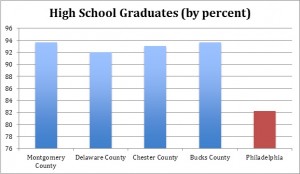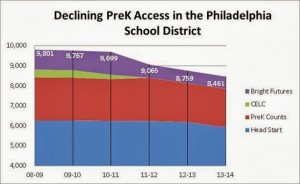The U.S. Census Bureau recently released its American Community Survey, and things don’t look good for the Philadelphia area. The survey found that more than a quarter of Philadelphians live in poverty, including more than a third of children. While disappointing, these numbers are far from surprising. As long as our leaders fail to invest properly in education, these numbers cannot improve. Without proper funding for education, starting with universal Pre-K, students will struggle in school, fail to graduate, and hold the economy down.
The median household income in Philadelphia in 2013 was less than $37,000, or about 70% of the statewide median and less than half the level of its four suburban counties. Just 82% of adults living in Philadelphia have a high school diploma, 7% less than Pennsylvania’s rate and 11% worse than the suburbs. If Philadelphia wants to fix its economic problem, it must first solve its education problem. That starts with Pre-K.
An investment in education must start early, before achievement gaps become too large and too costly to overcome. Studies show that every dollar spent on high quality early education comes back into society sevenfold in savings. Yet, there were just 8,461 Pre-K seats available to Philadelphia students last year, down 13% from three years earlier. While 4-year-olds in Pennsylvania’s publicly supported Pre-K programs saw dramatic academic and social gains, just 0.6% of the state budget goes to supporting high quality Pre-K programs. Kids who go through high quality Pre-K programs are more likely to graduate high school and have higher lifetime earnings. But with Philadelphia losing public Pre-K seats and many parents unable to afford sending their children to private Pre-K, the benefit remains unrealized.
The ACS data should serve as a wakeup call for the state: it’s time to get serious about funding early education. The problem is clear, an unacceptable number of Philadelphians drop out of school and live in poverty. But the answer is just as clear. Rather than cut funding for public education, forcing the School District of Philadelphia to cut back staffing and services year after year, invest in education—particularly early education where the investment pays off the greatest—and watch the city’s economy right itself. Without that investment, we don’t have to wait until next year to know what the Census Bureau’s next Survey is going to say.


